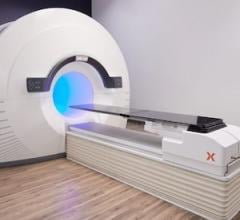May 6, 2011 – Two articles in the June issue of The Journal of Nuclear Medicine make a case for maintaining current U.S. Nuclear Regulatory Commission (NRC) regulations on the release of patients who undergo radioactive iodine treatments for thyroid cancer, known as I-131 therapy. Currently, the NRC recommends outpatient treatment for patients receiving radioactive iodine after total or near-total thyroidectomy.
However, several groups have been urging NRC to mandate overnight hospital stays to protect others from a perceived risk of radiation exposure.
The article, "Delayed Initial Radioactive Iodine Therapy Resulted in Poor Survival in Patients with Metastatic Differentiated Thyroid Carcinoma: A Retrospective Statistical Analysis of 198 Cases," evaluated the clinical factors that affected the survival of postoperative patients with differentiated thyroid cancer (DTC) in Japan. According to Tatsuya Higashi, M.D., Ph.D., this is the first report that shows the prognostic value of early performance of radioactive iodine therapy.
Researchers found that the risk of death for patients who received radioactive iodine treatment more than 180 days after a total thyroidectomy was 4.22 times higher than for those treated within the initial 180 days. Several reasons were cited as causing delays in treatment time in Japan, including strict regulation of radioactive materials, a long waiting list for admission to the radioactive iodine therapy ward and delayed referral by the surgeons who performed the total thyroidectomy.
In a related article, "The Real Cost of Theoretic Risk Avoidance: The Need to Challenge Unsubstantiated Concerns About I-131 Therapy," Stanley J. Goldsmith, M.D., cites the Japanese study as a reason to maintain current NRC regulations. If the NRC were to require overnight stays, he reasons, a backlog could result, causing delays in treatment of patients.
He further addresses the concerns of individuals and political representatives seeking to reverse or revise the current NRC guidelines on patient release after I-131 therapy, stating that in spite of many epidemiologic studies completed on the issue, low-dose radiation has never been established to be a causal factor in the development of malignancy. "In no instance," he writes, "is an individual likely to receive radiation exposure in excess of a level deemed exceedingly safe."
The Society of Nuclear Medicine issued a joint statement with the American Thyroid Association, The Endocrine Society and the American Association of Clinical Endocrinologists explaining that based on existing scientific evidence, the current I-131 regulations are safe for patients, their families and the public when radiation safety instructions are followed. However, SNM supports reexamination of this issue if new data emerge that support concerns about public safety.
For more information: jnm.snmjournals.org


 February 04, 2026
February 04, 2026 









